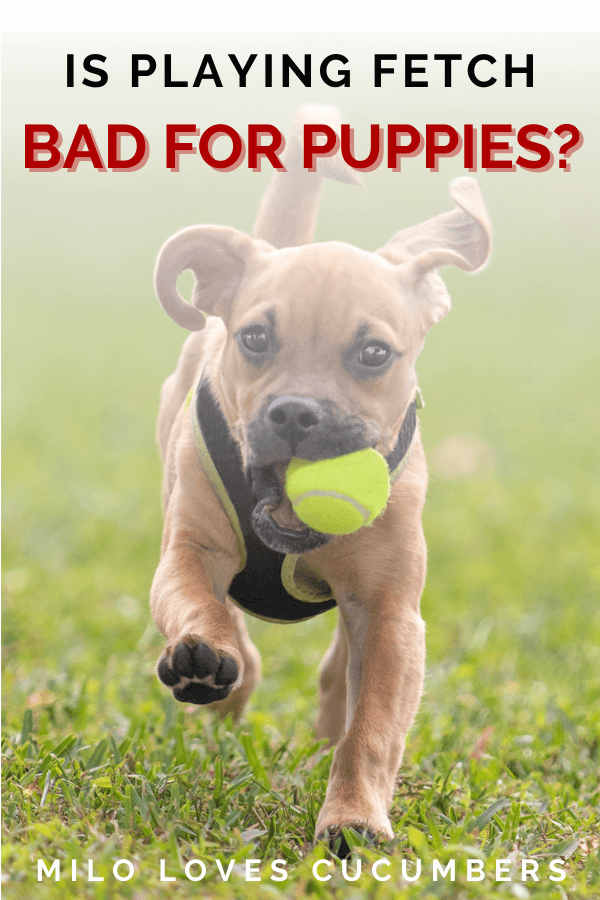Last weekend I was out for a walk with Milo when we came across this adorable puppy playing fetch with her new owner. Of course, Milo wanted to join in on the game so we stopped for a while to play. After a few minutes, I noticed the puppy huffing and puffing, often stopping to lay down or come back for water. Milo was fine, but the puppy seemed tired out almost immediately. That really got me wondering – is playing fetch bad for puppies?
The simple answer is that no, playing fetch is not bad for puppies – in moderation. Of course, there are other factors to consider like the length of time playing fetch, the size of the object they’re fetching, and the dog’s health, breed, and age. Also, unlike humans, dogs don’t sense if they are overexerting themselves so as responsible dog owners we should step in and prevent that from happening.

Disclosure: This post may contain affiliate links. If you purchase a product through one of our affiliate links we make a small commission from the sale at no extra cost to our readers.
Strain on Dog’s Legs
As a doggie mama, I am always concerned about the well-being of my pup’s health.
Fetch for me has always been an excellent way to get Milo to exercise, especially since he’s a huge dog!
He gets very excited and the thought that this can actually be harmful for him never crossed my mind.
But have you ever wondered what happens to your dog’s legs when they fetch?
Like suggested earlier there is no harm in playing fetch with your dog as long as the item to be fetched is fairly light. Puppies and other adult dogs usually shift 60% of their entire body weight on to their front legs and 40% of their weight onto their hind legs when they are fetching sticks, toys or tennis balls in their mouth.
This puts a lot of strain on their joints when they run and frolic which can increase the risk of injury in puppies, as well as older dogs.
That is one of the major reasons why heavy objects should be avoided because to compensate for the additional weight the poor little pup would need to “see-saw” forward which would put more weight on their front legs than their hind legs.
This would be burdensome for them.
Extra caution needs to be taken when playing with puppies. Unlike adult dogs, the small legs of puppies might not be able to cope with the increasing speed of running and jumping. This could severely affect their joints and soft tissues.
So if your fur baby is already suffering from an existing joint, tendon or muscle disorder then fetch might not be the game for them.
Retrieving is not bad for dogs as long no unnecessary stress is put on their limbs.
Fetch and Mental Health
Have you ever wondered why dogs love to play fetch?
It’s because it feeds their inborn characteristics to chase prey. Just watch when your dog sees a squirrel outside the window – usually their first reaction is to paw at the door and try to run after it.
The running and catching actions release adrenaline, which in turn releases the chemical cortisol. Cortisol is the stress hormone which plays a role in impacting the mood and also triggers fight or flight reactions – both in people and animals.
Constant obsession over playing fetch can lead dogs to develop OCD and hyperactivity, which can have severe repercussions down the road.
For example, dogs with OCD may be very possessive over their toys and even develop signs of aggression when anyone interferes. Obviously, this is not what we want for our pets.
Especially when there are younger children or other dogs around – the last thing you want is for your dog to become possessive or temperamental!
Fetch and Physical Health
There is no harm in playing fetch occasionally with your pooch, so long as you make sure they’re not over-exerting themselves. Failure to identify these signs of overexertion can have lasting negative effects on your dog.
And even if your pooch has hurt himself while playing fetch, the release of adrenaline will numb his pain and could result in serious physical injury and physical and mental exhaustion. This can also cause Exercise Induced Collapse (EIC) which could result in the dog collapsing within a few minutes while exercising.
Also, usually as pet owners, we get so carried away while playing fetch with our puppies’ that we forget to take the weather into account. Running fast to fetch the balls or sticks raises the dog’s heart rate and body temperature.
And sometimes we fail to realize that our pup is panting since carrying the ball prevents them from opening their mouth as they usually would.
We keep throwing the ball again and again, giving the poor fur babies no chance to cool down. If this lingers on for too long, it could result in heatstroke. Yikes!
Heatstroke kills healthy cells in the dog’s body. It can cause the brain to swell which could result in seizures. The dehydration could also result in kidney failure.
Make Fetch Safe
As previously mentioned, fetch can result in severe injuries for dogs. Oftentimes this is because we unintentionally push our pups too hard.
It’s important to remember that dogs cannot tell us when they are feeling sick or tired, so we should always be looking out for signs of stress. These can include collapse, trouble breathing, shaking, and an overall look of being disoriented.
However, there are several ways to make fetch a safe game for you and your puppy to enjoy:
- Always take breaks while playing fetch with your dog
- Always keep plenty of water on hand
- Do not use sticks as they can splinter and cause injury to your dogs mouth
- Look for signs of fatigue or injury and call your vet immediately if you notice any
- Limit the amount of time you play fetch, depending on the age of your dog
- Add in other forms of physical activity for your dog such as a walk around the neighborhood
- Avoid playing fetch on very hot days to avoid dehydration and heatstroke
- Consult your veterinarian if your dog has health issues before playing fetch
There is no harm in playing fetch with your puppy as long as it is done in moderation. As a doggie mama myself, I feel it is very important to ensure Milo has a balanced exercise routine with a good mix of walk and fetch to form a healthy physique.
When to start playing fetch with a puppy
The question often comes up on what age a puppy can start playing fetch outside. And there are a few factors to consider.
First off, the sooner you introduce a puppy to the game, the easier it will come to them. This follows the old saying – teaching an old dog to learn new tricks.
While it is possible to teach older dogs to fetch, it will take significantly more work then introducing them early on.
The next concern would be if your puppy has gotten their shots. You should never expose your puppy to the dog park or other areas where dogs have been before they have received their core vaccines.
The exact vaccinations vary by location, but usually include rabies, hepatitis, leptospirosis, distemper, parvo, and parainfluenza.
So if your puppy hasn’t finished their vaccines just yet, it might be best to start off by playing fetch inside the house.
How long should I play fetch with my Dog?
The suggested time spent on playing fetch is about 30 minutes to 2 hours. Of course, this varies dog to dog. This is because all dogs have different physical capabilities depending on their breed, health, and most of all, their age. Usually dogs cannot tell if they are tired and worn out and end up over-exerting themselves which could lead to several health issues. As pet owners it is our responsibility to act in the best interest of our dogs and prevent this from happening.
Are sticks unsafe for playing fetch?
It is best to avoid playing fetch with sticks. A shattered splinter can enter the soft tissue which could cause severe injuries in the mouth, abdomen and chest. Chewing on sticks can also lead to infections which can damage the stomach lining or cause parasites.
Is playing fetch with balls dangerous for dogs?
A tennis ball will have little to no weight shift on puppies who belong to larger breeds but have you ever wondered what happens if smaller dogs carry the same ball? The answer is that even a small tennis ball can cause weight shift on small breed puppies, resulting in immense strain on their front legs. If a small ball can do that then just imagine what a soccer ball could do.
There is nothing more fun than a harmless fetch game with your pooch. Dogs love chasing balls, and we love watching our pups get excited when we throw them. Just always remember to choose the best toy for your dog, whether it be a soft foam ball, a tennis ball or any other toy made for playing fetch!
Pin it for later!



